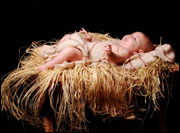When God is a baby
A soul story is a dream from the depths of a culture.
“There is no Batman at the manger,” one person said later.
“Probably not,” I answered, “but there is a lot we don’t know about what actually happened. Historically, we barely know Jesus lived, much less whether he was born in Bethlehem, or whether he was married to Mary Magdalene, or whether he went to India to study in the ‘lost years’ between being a twelve-year-old talking with the teachers in the temple and beginning his ministry as an adult.” I saw her eyes glaze over with this much information, and circled back to the point. “Right. Odds are against there having been a Batman.”
The baby in the manger is a soul story, if not an historical story. Soul stories are as likely to be true as stories from history, but they are perhaps a different sort of true, and you approach them differently. Before and after doing historical research, biblical study, and the kinds of work on context and language one does when looking at a story from scripture, my inclination is to interact with the story as I would with a dream.
Holding the image of the Divine as a baby in mind and heart, I invite myself to let go of my hold on the Abrahamic God, the ideas about the Divine I can live with or not, the elements of the concept of a God I believe in and those I don’t believe in. A soul story is a dream from the depths of a culture, not an individual. This is bigger than my squeamishness or my history.
When God is a baby, no one has to be afraid of God. No one has to tremble before God’s wrath. No one has to wonder what they have done wrong, how they have disappointed God. A baby God isn’t mad at you—in fact, he needs you to coo over him, hold him close, smell her head, curl her tiny fingers around your pinkie, protect him, and visit her with presents. No wonder Christmas is a well-loved holiday: We get to coo over the baby God, and feel the aching openness of a heart at its very beginning.
Among the ways to understand the Divine is as the spirit of love, the spirit of light, the spirit of life. A baby love, a baby light, a baby life would carry within itself all that it will become, like an oak within the acorn, like a mighty river that starts as a spring seeping out of the earth in a high and quiet place. The light starts as a tiny spark. A new baby love has all the possibilities in the world; it carries all the hopes and dreams. Later on, as it grows and matures, it becomes more real, and if you are skilled and lucky, it grows richer and deeper. As life starts you care for it and nurture it. You are careful with it. You delight in it. A baby is full of possibility.
What if this is a story about the soul entering the world of the body? The light of spirit and wisdom, the Divine seed planted in a human being? Some of the founders of our free religion believed that the seed of God, a tiny sliver of the light, was in each of us.
I think about the Divine seed, the wise baby, within me, containing the whole of divinity in itself, yet needing to grow. Antoine de Saint-Exupéry writes in Flight to Arras: “The seed haunted by the sun never fails to find its way between the stones in the ground.” Is my soul the seed, or is it the light? I say it is both. Do we long for the Divine, or are we divine ourselves? Both. Do we search for God or is God within us? Both.
In times of confusion and doubt, I see myself able to visit my soul like the magi, the wise magicians, and kneel before it with gifts of quiet, respect, and love. I can nurture the light, the seed of God within me. I can protect it from the forces of power over, which show up next in the faith story—the forces of fear and control, the Herod power, the light-killing, love-killing power of the outer world and of my inner world as well.
I wish for each of you at this time of the rebirth of the light that the light be reborn in you, that love be cradled in your heart, that you be a seed haunted by the sun, finding your way from the nurturing darkness, past all obstacles, stubbornly and rapturously breaking through to live in the light.
See sidebar for links to related resources.
Comments powered by Disqus







